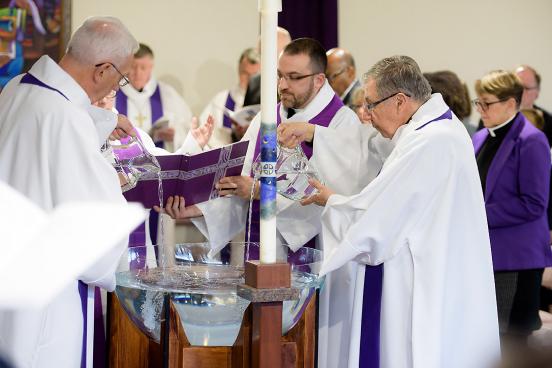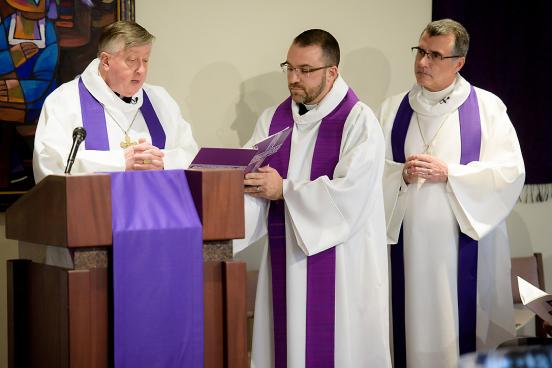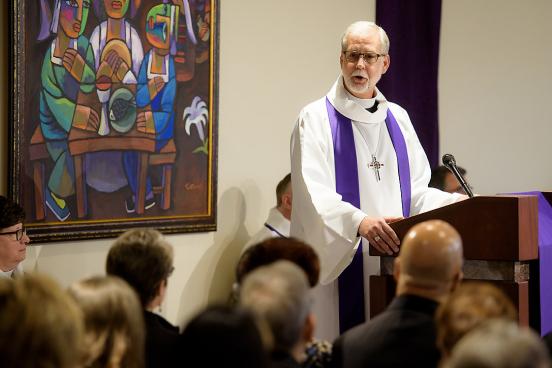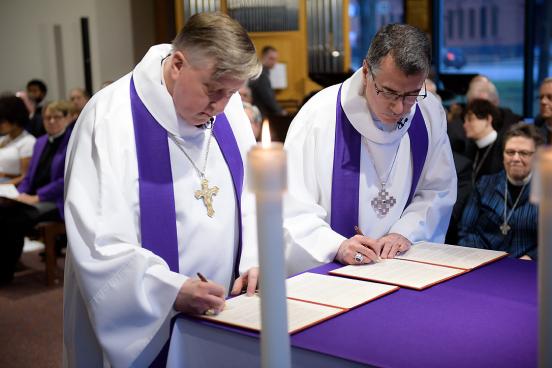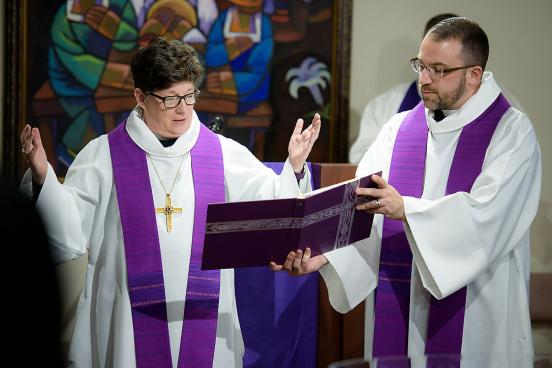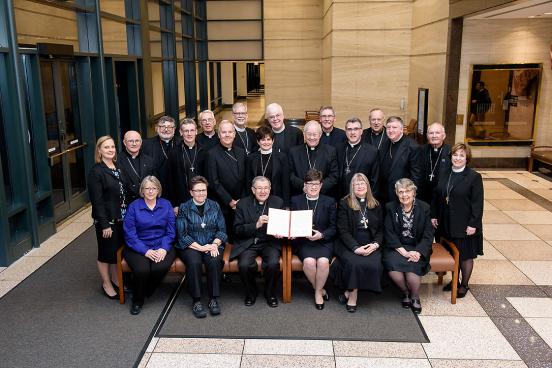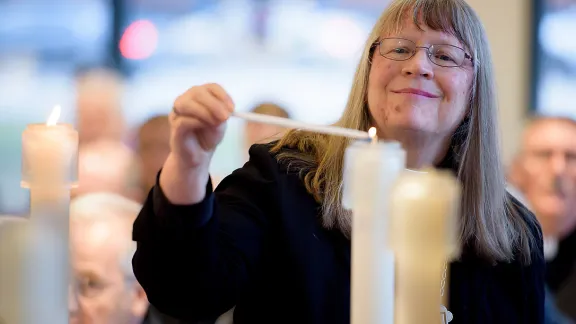
Rev. Jessica Crist, bishop of the Montana Synod of the Evangelical Lutheran Church in America, lights one of the candles for the ecumenical imperatives. Photo: C. Jason Brown/Insight Images
Lutherans and Catholics in the United States follow up on Joint Commemoration in Lund
(LWI) On 2 March the Evangelical Lutheran Church in America (ELCA) Conference of Bishops’ Ecumenical and Inter-Religious Committee and the United States Conference of Catholic Bishops’ Ecumenical and Interreligious Affairs Committee gathered for a Lutheran-Catholic service of Common Prayer.
The service was held in Chicago and it followed the Common Prayer liturgical guide, developed for the Joint Catholic-Lutheran Commemoration held in Lund, Sweden, on 31 October 2016, co-hosted by Pope Francis on behalf of the Catholic Church and The Lutheran World Federation (LWF) President Bishop Dr Munib Younan and LWF General Secretary Rev. Dr Martin Junge on behalf of the LWF.
“For 500 years Lutherans and Catholics have been divided into two camps, each believing that the other was not only wrong but alien,” said the Rev. Elizabeth A. Eaton, presiding bishop of the ELCA. “Yet we know that people are yearning for reconciliation. The Lutheran-Roman Catholic joint prayer service, one of the fruits of 50 years of dialogue between our two churches, was a beautiful celebration of what we hold in common. We could see each other again as brothers and sisters in Christ. I pray that our increasing unity is a witness to our culture.”
“Rejoicing in the healing of memories”
During the service – in a significant moment that underscored 50 years of global Lutheran-Catholic dialogue – a joint statement was presented and signed by the committee chairs, the Rev. Donald P. Kreiss, bishop of the ELCA Southeast Michigan Synod; and the Most Rev. Mitchell T. Rozanski, bishop of the Catholic Diocese of Springfield, Mass.
The statement mirrored the joint statement signed by Pope Francis and the Rt. Rev. Dr. Munib Younan, The Lutheran World Federation president, during the service in Lund.
The Lutheran-Roman Catholic joint prayer service, one of the fruits of 50 years of dialogue between our two churches, was a beautiful celebration of what we hold in common.
“In joyful gratitude to God, we are gathered today to encourage one another in the ministry of reconciliation to which Christ has called us,” the statement reads. “Recalling the wisdom of the international Lutheran-Catholic dialogue report, ‘From Conflict to Communion,’ we affirm that ‘while the past itself is unalterable, the presence of the past in the present is alterable. In view of 2017, the point is not to tell a different history, but to tell that history differently.’ So, while the past cannot be changed, we rejoice in the healing of memories we have already seen, and we ask God’s guidance toward a transformed future, renewed in our relations to one another and in our witness to the world.”
“It’s a wonderful, concise statement of where we are now and acknowledging where we’ve come from, including [the service in] Lund,” said Bishop Denis J. Madden, auxiliary bishop for the Catholic Archdiocese of Baltimore. “I think the whole movement of Lutheran-Catholic reconciliation is moving forward in a good way.”
“Our desire to share at the table together is always felt at our meetings,” said Madden. “It’s what we all long for – to share at the table together. More and more, the pain of separation is becoming a lived reality in all life. We see it in families, and we see it in the leadership of both churches.”
The Rev. William O. Gafkjen, bishop of the ELCA Indiana-Kentucky Synod and chair of the ELCA Conference of Bishops, described the service as “important and exciting historically because of five centuries of separation – especially after the last 50 years – to be coming so close together. We are still honest about our differences, but celebrating what we share is a powerful witness to the world.”
Five imperatives for Catholics and Lutherans
The service also included the reading of five ecumenical imperatives found in “From Conflict to Communion” A candle was lit after the reading of each imperatives. The imperatives are a pledge for Lutherans and Catholics to always begin from the perspective of unity and not from the point of division, to let themselves be continuously transformed by the encounter with one another, to again commit themselves to seek visible unity and to elaborate together what this means in concrete steps, to jointly rediscover the power of the Gospel of Jesus Christ for our time, and to witness together to the mercy of God in proclamation and service to the world.
“It’s so important that we’ve had these dialogues but that also we take this time to pray together,” said Rozanski, “We’re really, in coming together in prayer, signaling that we’re coming together in Christ. At a time when everyone seems to be shouting past one another, it’s important to model that we can talk about our differences in a civil way.”
“Today can be the beginning of a new chapter of that relationship, where we can join together, celebrating all that we have in common, which is so much greater than what divides us, and figure out how then we are called to go out into the communities where we live and preach the gospel,” said Kreiss.
By ELCA Communications. Edited by LWF Communications.
